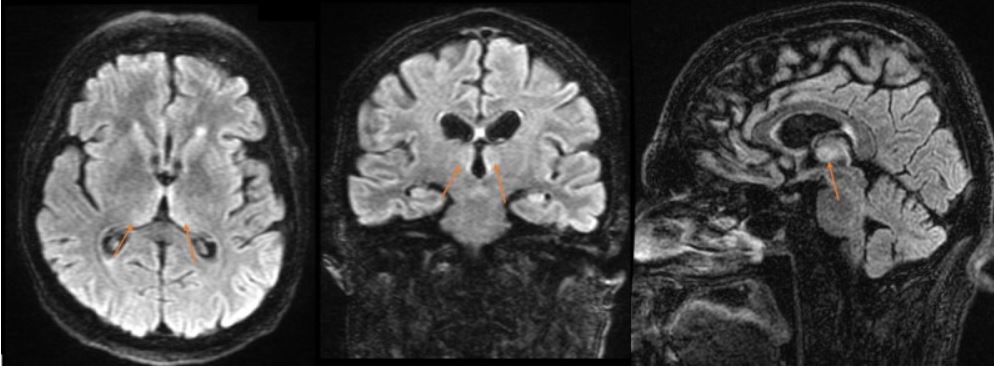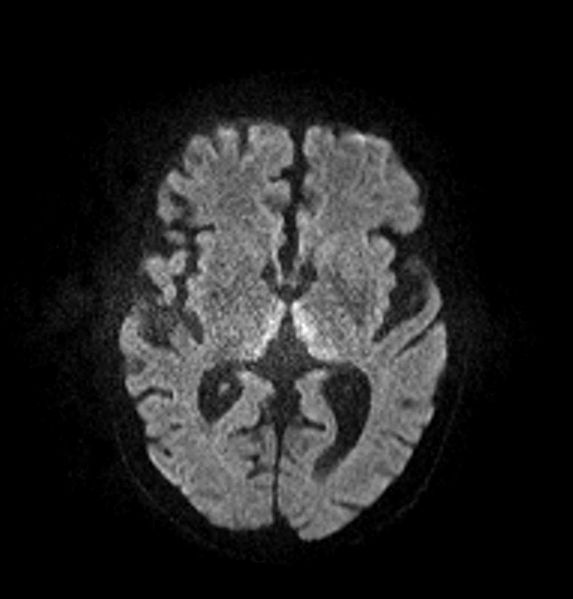Playlist
Show Playlist
Hide Playlist
Clinical Correlations: Wernicke–Korsakoff Syndrome (WKS), Klüver–Bucy Syndrome and Alzheimer´s Disease
-
Slides 18 LimbicSystem BrainAndNervousSystem.pdf
-
Reference List Anatomy.pdf
-
Download Lecture Overview
00:00 The Limbic System does presents some fairly fascinating clinical correlations once syndrome of note here is Wernicke-Korsakoff Syndrome. 00:16 This syndrome is characterized as a chronic memory disorder. 00:22 and it is caused by a vitamin B1 or thiamine deficiency. 00:29 and this is typically the result of chronic alcohol abuse. 00:36 In Wernicke-Korsakoff Syndrome, there's damage to the mammillary bodies and the mammillary bodies are shown in through here. 00:44 These are paired structures and there's also damage to the dorsomedial thalamic nucleus. 00:51 However, this is not shown in this particular image. 00:55 Next, I want you to understand the symptoms that may result from lesions to the structures involved in Wernicke-Korsakoff Syndrome. 01:05 First, is that the individual with kind of lesion or syndrome they will have difficulty at learning new information. 01:15 Secondly, they’ll have an inability to remember recent events in their life and because of this inability to remember at recent events they become prone to making up information that they do not remember and this is also termed confabulate information, make it up. 01:39 Another interesting clinical correlation that relates to the Limbic System is Kluver-Bucy Syndrome. 01:48 This is a rare syndrome in humans but when we understand the impact of lesions on the components of the Limbic System, the symptomology that results does make sense. 02:04 Kluver-Bucy Syndrome is characterized by bilateral lesions of the amygdala and the hippocampus. 02:13 And those structures are shaded here in the image. 02:17 So here’s your amygdala and here’s your hippocampus. 02:21 Causes of Kluver-Bucy as syndrome could be due to trauma or herpes encephalitis. 02:28 What are some of the symptoms for you to understand that relate to an individual having of this syndrome? One symptom is they’ll have a visual disturbance that will be visual agnosia. 02:42 They also have oral tendencies so they will have a tendency to put objects in their mouth. 02:50 Hypermetamorphosis is another symptom associated with Kluver-Bucy as syndrome because of the emotional functions that’s attached to these components the structure to the Limbic System, individuals with this syndrome tend to have diminished or muted emotional responses to a stimuli. 03:12 And as a curiosity they tend to display hypersexuality. 03:20 Another clinical correlation to consider and this is our last clinical correlation is that of Alzheimer Disease. 03:30 This is going to be due to severe atrophy of the hippocampus in this area, accumulation of senile plaques of alpha beta amyloid would be seen histologically. 03:46 And then we also see histologically an accumulation of neurofibrillary tangles of hyper phosphorylated tau proteins. 03:58 As the disease progresses, it will involve more global brain structures to include the cerebral cortex, the occipital lobe is spared in cortical atrophy. 04:12 and as you lose the cortex, individuals with Alzheimer Disease will display a widening of the sulci. 04:21 Alzheimer Disease is the most common form of dementia. 04:29 It typically has a late-onset so it does occur later in life. 04:34 However, in some cases it may have an early-onset. 04:40 So maybe the symptoms of Alzheimer Disease start to manifest in an individual who is in their 40s. 04:50 And this tends to have an accelerated course so it occurs more rapidly than a late-onset form of Alzheimer disease. 05:00 What are some of the symptoms for you to understand regarding the Alzheimer Disease? One is individuals that are affected will have memory impairment. 05:13 This may start initially as forgetting where items are located. 05:20 I misplaced my car keys, I misplaced my eyeglasses and I’m having difficulty finding them. 05:26 An individual may become disoriented and lost. 05:31 And they are unable to navigate from home to work or work to home or something as simple as walk around the community which they reside, that they get in the car, they may be traveling that great distance not really knowing where they’re at. 05:48 They tend to have at some point difficulty with numbers. 05:54 Another symptom associated with Alzheimer Disease that the individual do not respond effectively or normally with their interactions. 06:03 And lastly, individuals will demonstrate various behavioral changes that are most notable by family members.
About the Lecture
The lecture Clinical Correlations: Wernicke–Korsakoff Syndrome (WKS), Klüver–Bucy Syndrome and Alzheimer´s Disease by Craig Canby, PhD is from the course Limbic System. It contains the following chapters:
- Wernicke-Korsakoff Syndrome
- Klüver-Bucy Syndrome
- Alzheimer Disease
Included Quiz Questions
Which of the following symptoms do individuals with Wernicke-Korsakoff syndrome NOT have at presentation?
- Hyperfocus on their surroundings
- Gait ataxia
- Fabricating information they do not remember
- Inability to remember recent events
- Difficulty learning new information
Which of the following statements about Klüver-Bucy syndrome is NOT true?
- Patients present with increased emotional responses.
- There is a bilateral lesion in the amygdala and hippocampus.
- Visual agnosia and hypermetamorphosis are prominent symptoms.
- Patients have inappropriate sexual behavior.
- Trauma and herpes encephalitis are the possible etiologies.
Which of the following is spared during progressive cortical atrophy in Alzheimer’s disease?
- Occipital lobe
- Frontal lobe
- Parietal lobe
- Temporal lobe
- None of the above
Customer reviews
5,0 of 5 stars
| 5 Stars |
|
2 |
| 4 Stars |
|
0 |
| 3 Stars |
|
0 |
| 2 Stars |
|
0 |
| 1 Star |
|
0 |
Very well-explained and thus helpful lectures! Also, the images are better than anywhere else.
1 customer review without text
1 user review without text





